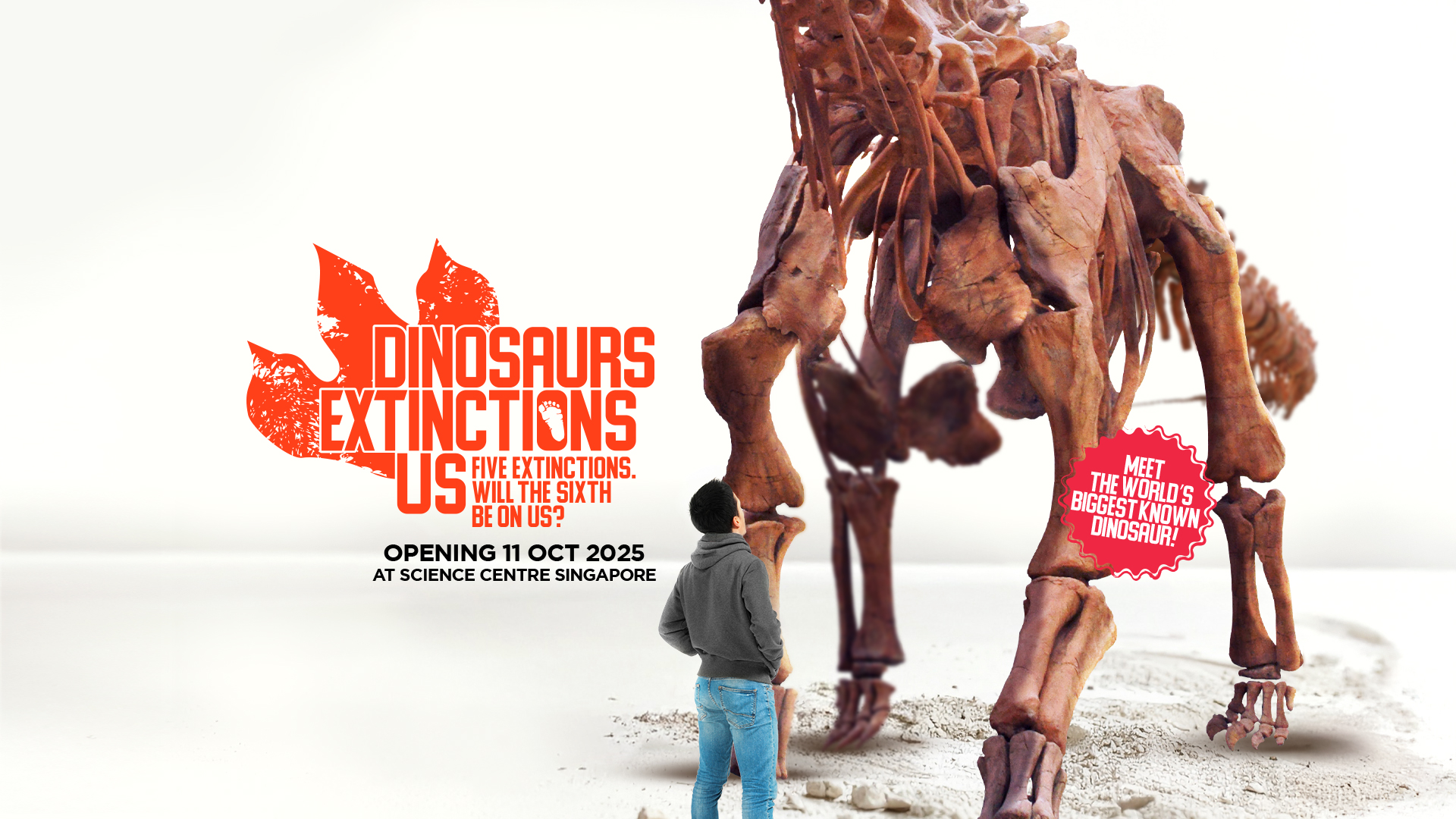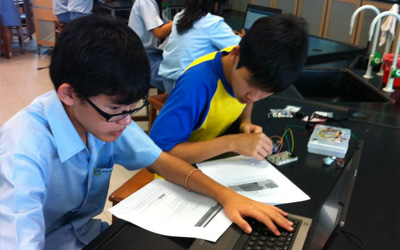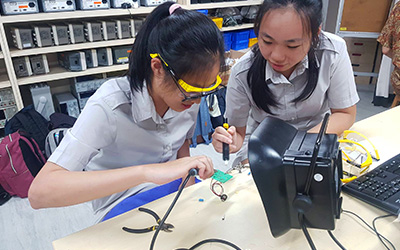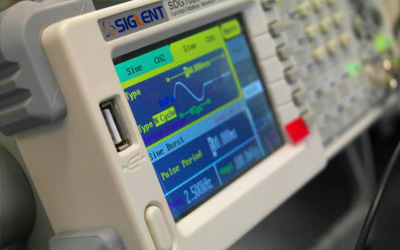What we offer
Our teacher professional development workshops are largely based on existing student programmes. You can view our suite of student programmes here. Our PD workshops are listed below.
Suggested times: Mondays to Fridays: 9:30am or 2.30pm
Course fee per participant: $60-80 (Additional charges will apply, for any customisation )
Workshop fees indicated are for bookings by Singapore-based schools only.
Please fill in the Teacher Booking Form and email the completed to cradle@science.edu.sg or fax to 6561 6361.
For booking enquiries, please email cradle@science.edu.sg.
Terms & Conditions
Science Centre Singapore and its group of attractions shall not be responsible or liable in any way for any loss, injury or mishap (including personal injury) of any student and/or teacher unless such loss, injury or mishap (including personal injury) was caused by the negligence of Science Centre Singapore, including its employees or agents.
Physical Sciences Workshops
-
Diffusion Cloud Chamber
Description
What does meteorology have to do with particle physics? In this workshop, participants will learn how a serendipitous observation led to the development of the cloud chamber particle detector by Charles Wilson (Nobel prize 1927). “The most wonderful and original instrument in scientific history”, as Lord Rutherford, the “father of nuclear physics”, called it, enabled further work resulting in several other Nobel prizes.
Teachers will:construct a diffusion cloud chamber.
observe the different signatures left behind by ionizing radiation, such as cosmic ray particles.
experience and realize the omnipresence of background ionizing
radiation.Mode of Delivery Workshop Topics Properties of gases, Kinetic model, Magnetic effect of a current, Force on a current-carrying conductor, Background radiation and nuclear decay. Duration 2 hours Time Mondays to Fridays: 9.30am or 2.30pm Course Fee $60/pax (Admission fees to Science Centre applies to Non-Institutional School Members) -
Measuring Magnetic Field Strength
Description
Besides gravity, electromagnetism is the next most encountered force
in our everyday life. It is of immense practical importance and underlies
numerous innovations that propelled humanity into the modern age –
e.g. electricity generation (motors and transformers), modern
communications and optics.
This workshop explores the relation between static magnetic fields,
electrical currents, and forces resulting from their interaction. The
methods used are of high relevance to “current events” as the
international system of units and measurements (SI) is expected to
switch to electromagnetic methods for defining base units such as the
kilogramme in the near future.
Teachers will:measure the Earth’s magnetic field strength using a compass and a
current-carrying conductor.determine the magnetic constant (“permeability of free space”), 𝜇o
using a current balance.get a taste of how fundamental constants and units are determined
or reproduced.Mode of Delivery Workshop Topics Electromagnetism, Ampere's Law, Bio- Savart Law, Forces & friction, Principle of moments, D.C. motor Duration 3 hours Time Mondays to Fridays: 9.30am or 2.30pm Course Fee $60/pax (Admission fee to Science Centre applies to Non-Institutional School Members) -
Measuring the Speed of Light (Basic/Advanced)
Description
19th century experiments (e.g. by Michelson and Morley) and new theoretical approaches (Lorentz/Einstein) established the speed of light, c, as a fundamental property that ties together space-time, the fabric of the universe. The speed of light is hence not just of great importance in the fields of optics and astronomy, but also fundamental for the microscopic structure of the world, e.g. in quantum physics. The speed of light also lies at the heart of everyday measurements: since 1983, the SI unit for length, the metre, is derived from the speed of light.
Teachers will:
(Basic) determine the speed of light in air using a laser diode, a photo detector, and common electronic measurement instruments.
(Advanced) explore and appreciate general problems in fast measurements (and how to deal with them) which may also clear some common misconceptions on how signals travel along a cable.
Mode of Delivery Workshop Topics Speed of light. Geometric optics (mirrors). Laser diodes and photo diodes (photonics). Application of electronic instrumentation. Difference measurements. Data analysis. Optional: Finite propagation velocity of electric signals in a cable. Reflections on a cable and termination. Junction capacitance of photo diode. Duration 3 hours Time Mondays to Fridays: 9.30am or 2.30pm Course Fee $60/pax (Admission fee to Science Centre applies to Non-Institutional School Members) -
Superconductivity
Description
The electrical conductivity of certain materials changes dramatically as they are cooled to sufficiently low temperatures. In 1911, Heike Kamerlingh-Onnes (Nobel Prize 1913) found that some materials might enter a state where electrical resistance completely disappears. While in this superconducting state, quantum mechanical effects in the material manifest themselves at the macroscopic scale, in the form of zero electrical resistance, as well as perfect diamagnetic properties (resulting in Meissner levitation).
Teachers will:
learn to reliably measure very small resistances using the 4-point method.
conduct resistance measurements on a superconducting material as it is slowly cooled to liquid nitrogen temperatures.
determine the critical temperature TC.
observe the disappearance of electrical resistance at low temperatures.
Mode of Delivery Workshop Topics Principle of thermometry, Resistance and Ohm's Law, Circuit diagrams, Band theory Duration 3 hours Time Mondays to Fridays: 9.30am or 2.30pm Course Fee $60/pax (Admission fee to Science Centre applies to Non-Institutional School Members) -
Diffraction as Metrology Tool
Description
The study of light has been a major topic since the time of the ancient Greeks. In early 18th century, Sir Isaac Newton proposed that light must be made up of particles to explain its straight line propagation. It wasn’t until the early 19th century that the wave theory of light gained popularity when Thomas Young demonstrated diffraction effects using two closely spaced slits. This laid the foundation for a modern understanding of optics, including breakthrough applications like crystal/molecular structure analysis using X-ray diffraction (Laue and Bragg/Bragg, Nobel prizes 1914 and 1915, and many more Nobel prizes).
Teachers will:
appreciate how diffraction arises as a consequence of the constructive and destructive interference.
relate the wavelength of light, the microscopic structure of the diffracting object, and the resulting diffraction patterns to each other.
use the characteristics of diffraction to perform measurements of wavelengths or microscopic structure sizes.
Mode of Delivery Workshop Topics Light. Waves. Geometric optics (real and virtual images). Superposition and interference. Diffraction (using transmissive and reflective gratings). Spectral lines. Babinet’s principle. Duration 3 hours Time Mondays to Fridays: 9.30am or 2.30pm Course Fee $60/pax (Admission fee to Science Centre applies to Non-Institutional School Members) -
Optical Spectroscopy
Description
Spectroscopy is a class of techniques that investigates how radiation (such as, but not limited to light) is affected by interactions with matter. Our understanding of the micro- and macro-cosmos is largely based on spectroscopic observations. Spectroscopic techniques are also everyday characterization tools in materials science, chemistry, physics, life sciences, astronomy, and more and are taught early in chemistry.
This workshop has close links to our workshops on diffraction and Bohr’s atomic model, but focuses on qualitative characteristics of optical spectra and how they are linked to the atomic/molecular structure of materials.
Teachers will:
build (and keep!) a pocket spectroscope with surprisingly good performance.
explore characteristics of different types of spectra (atomic, molecular and solid state).
link the spectra to quantum concepts (energy levels, orbitals).
identify different types of light sources through their spectra.
observe Fraunhofer absorption lines in the daylight spectrum.
Mode of Delivery Workshop Topics Diffraction. Electromagnetic spectrum & light. Structure of atoms & origin of spectral lines. Spectral analysis. Structure of molecules/solid state matter and resulting spectra. Investigation of common light sources. Absorption and emission spectra. Fraunhofer lines. Duration 3 hours Time Mondays to Fridays: 9.30am or 2.30pm Course Fee $60/pax (Admission fee to Science Centre applies to Non-Institutional School Members) -
Fuel Cells
Description
Fuel cells hold great promise in today’s global relentless search for new demand and supply of clean energy. In this workshop, participants will learn about the different fuel cell technologies and gain insight into the working principles of Alkaline and Proton Exchange Membrane (PEM) fuel cells. Participants will get hands-on experience to perform electrolysis of water using solar energy (weather permitted) and store the hydrogen gas obtained to be used in a PEM fuel cell. Participants will also conduct experiments to find out the minimum voltage required to electrolyse water. Mode of Delivery Workshop Topics Energy, Work & power, States of matter, Current of electricity, DC circuits, Chemistry of reactions (electrolysis, energy from chemicals), Stoichiometry and mole concept, Air, Electrochemistry Duration 3 hours Time Mondays to Fridays: 9.30am or 2.30pm Course Fee $60/pax (Admission fee to Science Centre applies to Non-Institutional School Members) -
Organic Solar Cells
Description The advent of solar cells in 1883 by Charles Fritts was the beginning of the vast advancement of methods to harness the renewable energy as a form of clean energy. In the 1990s, the notion to mimic photosynthesis has led to the development of Organic Solar Cells. This technology replaces chlorophyll in green plants with organic dyes (such as blueberry extract) and uses other electrolytes and catalysts to simulate the internal environment of a leaf. In this workshop, students will fabricate and assemble an organic solar cell. Using our inhouse kit, students will perform characterization of their solar cell and plot a graph to identify the maximum power of the solar cell. Mode of Delivery Workshop Topics Current of Electricity (I-V graph), Redox Reaction Duration 3 hours Time Mondays to Fridays: 9.30am or 2.30pm Course Fee $60/pax (Admission fee to Science Centre applies to Non-Institutional School Members)
Microcontrollers Workshops
-
Introduction to Microcontrollers 1 & 2
Description
Microcontrollers are integrated circuits (IC) chips that are able to process input and control machines and devices based on their written program. One example is the rice cooker. A microcontroller in the cooker controls the heating coil and with its array of sensors, emulates the manual cooking of rice on a stove. In our current lifestyle, it is rare to find a product that does not involve a microcontroller at some stage of its operation.
Teachers will:
learn about components – LEDs, piezo buzzers, light dependent resistors (LDRs), resistors.
learn basic programming structure, terminology and simple codes.
prototype circuits using the breadboard.
Participants will also be introduced to more electronic components and programming syntax. They will learn more advanced methods of controlling the same components to achieve more complex results. Concepts such as Charlieplexing and multiplexing will also be introduced and these will come in handy in future workshops when dealing with 7-segment LED displays or LED cube projects.
Teachers will:
learn about components – Servo motors, RGB LEDs, potentiometers.
learn concepts such as multi-plexing, Charlieplexing and persistence of vision (POV)
Mode of Delivery Workshop Topics D.C. circuits. Electronic systems. Experimental skills and investigations (recording observations, planning, interpreting and evaluating investigations). Duration 5 hours Time Mondays to Fridays: 9.30am or 2.30pm Course Fee $80/pax (Admission fee to Science Centre applies to Non-Institutional School Members) -
Data-Logging
Description
Data logging is a common application in many science laboratories. In this workshop, participants will learn how to integrate micro-controllers, sensors and data storage devices to make their very own data loggers. The challenge activity will see participants designing and incorporating the different sensors to form an environmental monitoring system.
Teachers will:
learn about components – pH sensor, humidity / temperature sensor, gas sensor, SD card read / write module.
Mode of Delivery Workshop Topics D.C. circuits. Electronic systems. Experimental skills and investigations (recording observations, planning, interpreting and evaluating investigations). Duration 3 hours Time Mondays to Fridays: 9.30am or 2.30pm Course Fee $60/pax (Admission fee to Science Centre applies to Non-Institutional School Members) -
Distance & Motion Sensing
Description
In this workshop, participants will learn about the science behind the different distance and motion sensors and integrate them with components learnt in the Introduction series to come up with real life applications. Further applications to these sensors can be found in the field of robotics.
Teachers will:
- learn about components – PIR motion sensor, ultrasonic distance sensor, IR rangefinder.
Mode of Delivery Workshop Topics D.C. circuits. Electronic systems. Experimental skills and investigations (recording observations, planning, interpreting and evaluating investigations). Duration 3 hours Time Mondays to Fridays: 9.30am or 2.30pm Course Fee $60/pax (Admission fee to Science Centre applies to Non-Institutional School Members) -
Introduction to Microcontroller 3
Description
Ever wondered how an automated venting system works? Imagine yourself building a smart fan that can sense the temperature and control the motor accordingly. In this workshop, participants will learn the necessary components to do just that, while learning about physics concepts such as convection and fan blade aerodynamics.Mode of Delivery Workshop Topics D.C. circuits. Electronic systems. Experimental skills and investigations (recording observations, planning, interpreting and evaluating investigations). Duration 3 hours Time Mondays to Fridays: 9.30am or 2.30pm Course Fee $60/pax (Admission fee to Science Centre applies to Non-Institutional School Members)




.jpg)





